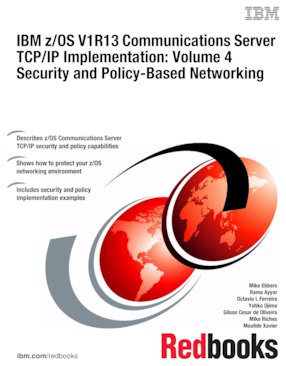
Published on 29 March 2012, updated 10 February 2016
Share this page:
ISBN-10: 0738436585
ISBN-13: 9780738436586
IBM Form #: SG24-7999-00
Authors: Mike Ebbers, Rama Ayyar, Octavio L. Ferreira, Yohko Ojima, Gilson Cesar de Oliveira, Mike Riches and Maulide Xavier
Abstract
For more than 40 years, IBM® mainframes have supported an extraordinary portion of the world’s computing work, providing centralized corporate databases and mission-critical enterprise-wide applications. The IBM System z®, the latest generation of the IBM distinguished family of mainframe systems, has come a long way from its IBM System/360 heritage. Likewise, its IBM z/OS® operating system is far superior to its predecessors in providing, among many other capabilities, world-class and state-of-the-art support for the TCP/IP Internet protocol suite.
TCP/IP is a large and evolving collection of communication protocols managed by the Internet Engineering Task Force (IETF), an open, volunteer organization. Because of its openness, the TCP/IP protocol suite has become the foundation for the set of technologies that form the basis of the Internet. The convergence of IBM mainframe capabilities with Internet technology, connectivity, and standards (particularly TCP/IP) is dramatically changing the face of information technology and driving requirements for even more secure, scalable, and highly available mainframe TCP/IP implementations.
The IBM z/OS Communications Server TCP/IP Implementation series provides understandable, step-by-step guidance about how to enable the most commonly used and important functions of z/OS Communications Server TCP/IP.
This IBM Redbooks® publication explains how to set up security for the z/OS networking environment. Network security requirements have become more stringent and complex. Because many transactions come from unknown users and untrusted networks, careful attention must be given to host and user authentication, data privacy, data origin authentication, and data integrity. We also include helpful tutorial information in the appendixes of this book because security technologies can be quite complex.
Table of Contents
Part 1. SAF-based security
Chapter 1. RACF demystified
Chapter 2. Protecting network resources
Part 2. Managing security
Chapter 3. Certificate management in z/OS
Part 3. Policy-based networking
Chapter 4. Policy agent
Chapter 5. Central Policy Server
Chapter 6. Quality of service
Chapter 7. IP filtering
Chapter 8. IP Security
Chapter 9. Network Security Services for IPSec clients
Chapter 10. Network Security Services for WebSphere DataPower appliances
Chapter 11. Network Address Translation traversal support
Chapter 12. Application Transparent Transport Layer Security
Chapter 13. Intrusion detection services
Chapter 14. IP defensive filtering
Chapter 15. Policy-based routing
Part 4. Application-based security
Chapter 16. Telnet security
Chapter 17. Secure File Transfer Protocol
Appendix A. Basic cryptography
Appendix B. Telnet security advanced settings
Appendix C. Configuring IPSec between z/OS and Windows
Appendix D. zIIP Assisted IPSec
Appendix E. z/OS Communications Server IPSec RFC currency
Appendix F. Our implementation environment